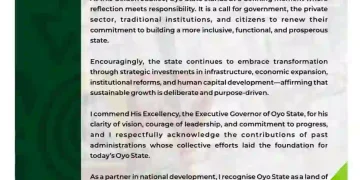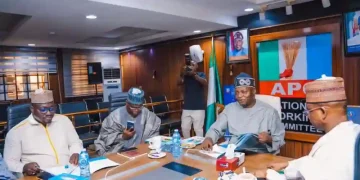The Federal Government has called on Nigerian journalists to exercise greater responsibility in security reporting, warning that sensationalised coverage could inadvertently advance the objectives of terrorist groups and compromise national security.
Minister of Solid Minerals Development, Dele Alake, issued the appeal on Wednesday during a joint ministerial press briefing with the Minister of Information and National Orientation, Mohammed Idris, at Radio House in Abuja.
Alake praised the Information Minister for presenting what he termed “instructive statistics and data” that challenge perceptions of government inaction on insecurity. He emphasised that the Tinubu administration relies on “empirical verification, not emotional rhetoric” when addressing security challenges.
The minister highlighted comprehensive reforms within Nigeria’s security framework, including leadership restructuring across security agencies since 2023, which he claimed are producing tangible results. He cited recent global assessments indicating that Nigeria has recorded some of its lowest insecurity figures in a decade.
Alake also contended that most security incidents in the country stem from economic and political factors rather than religious persecution, cautioning against narratives that misrepresent the motivations behind attacks.
Press Responsibility and National Stability
Invoking the “responsibility theory of the press,” Alake argued that media organisations must balance the public’s right to information with the imperative to maintain social stability.
“If there is no society, there is no press. We must protect the sanctity of our nation so that we can practice our profession in peace,” he stated.
The minister took particular issue with what he described as unbalanced reporting of military operations. He pointed to a pattern where attacks on security forces receive prominent, definitive coverage, while successful military operations against insurgents are framed with scepticism.
“When terrorists kill soldiers, the headline screams it. But when the military neutralises terrorists, the report says ‘the military claims’. That framing creates doubt, fuels propaganda, and strengthens the enemy,” Alake argued.
Alake issued a stern warning against what he characterised as manipulation by domestic political actors and foreign-backed organisations promoting divisive narratives for strategic or ideological purposes, labelling such activities as “sabotage.”
“The media must resist being used as a tool for internal division or foreign manipulation. Every nation has disagreements, but weaponising them is not the solution,” he said.
Call for Patriotic Journalism
The minister concluded by urging journalists to prioritise national unity, maintain accuracy in reporting, and enhance public awareness on security matters.
“The media has a duty to help protect the stability of our country. If there is no peace, there can be no press. We need a united and secure Nigeria for journalism—and democracy, to thrive,” Alake said.
The government’s appeal comes amid ongoing debates about press freedom and the media’s role in holding authorities accountable, particularly regarding security challenges that have persisted across multiple administrations.

Seunmanuel Faleye is a brand and communications strategist. He is a covert writer and an overt creative head. He publishes Apple’s Bite International Magazine.





















